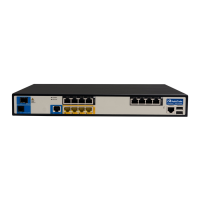Reference Guide 456 Document #: LTRT-17939
Mediant MSBR
Command Description
dst-type {all-
users|destination-
tag|dial-plan|dst-
address|enum|gateway|h
unt-group|internal|ip-
group|ip-group-
set|ldap|request-
Determines the destination type to which the outgoing SIP
dialog is sent.
dst-user-name-pattern
Defines the prefix of the incoming SIP dialog's destination
URI (usually the Request URI) user part. You can use
special notations for denoting the prefix. T
group-policy
Defines whether the routing rule includes call forking.
internal-action
Defines a SIP response code (e.g., 200 OK) or a
redirection response (with an optional Contact field
indicating to where the sender must re-send the message)
that the device sends to the sender of the incoming SIP
dialog (instead of sending the call to another destination).
The parameter is applicable only when the 'Destination
Type' parameter in this table is configured to Internal.
Assigns an IP Group Set to the routing rule.
message-condition-name
Assigns a SIP Message Condition rule to the IP-to-IP
Routing rule.
re-route-ip-group-name
Defines the IP Group that initiated (sent) the SIP redirect
response (e.g., 3xx) or REFER message.
request-type
{all|invite|invite-
and-register|invite-
and-
subscribe|options|regi
Defines the SIP dialog request type (SIP Method) of the
incoming SIP dialog.
route-name
Defines a descriptive name, which is used when
associating the row in other tables.
Defines a routing tag name.
sbc-routing-policy-
Assigns a Routing Policy to the rule.
src-host
Defines the host part of the incoming SIP dialog's source
URI (usually the From URI).
src-ip-group-name
Defines the IP Group from where the IP call is received
(i.e., the IP Group that sent the SIP dialog).
src-tags
Assigns a tag to denote source URI user names
corresponding to the tag configured in the associated Dial
Plan.
src-user-name-pattern
Defines the prefix of the user part of the incoming SIP
dialog's source URI (usually the From URI).

